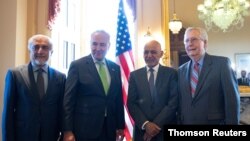U.S. President Joe Biden will meet with Afghanistan President Ashraf Ghani and chief peacemaker Abdullah Abdullah at the White House on Friday.
The first face-to-face interaction between Biden and Afghan officials comes ahead of the withdrawal of the remaining U.S. and NATO forces from Afghanistan by Sept. 11, in line with Biden’s direction to close what he has described as the “forever war.”
White House press secretary Jen Psaki said earlier this week that Biden “looks forward to welcoming” the Afghan leaders and will reassure them of U.S. diplomatic, economic and humanitarian support for the turmoil-hit country as the drawdown continues.
Ghani and Abdullah arrived in Washington Thursday and met with Senate leaders Chuck Schumer and Mitch McConnell.
“The visit by President Ghani and Dr. Abdullah will highlight the enduring partnership between the United States and Afghanistan as the military drawdown continues,” Psaki said.
Ghani's aides said he would raise the issue of future ties between the two countries and continued assistance for Afghan security forces.
The foreign military drawdown, which formally started on May 1, has led to an unprecedented escalation in fighting between Afghan security forces and Taliban insurgents, dealing fresh blows to slow-moving U.S.-brokered peace negotiations between the Afghan adversaries.
The insurgents have in recent weeks captured dozens of new districts and both sides are said to have suffered heavy casualties, with Afghan civilians continuing to bear the brunt of the country’s long war.
Late Thursday, U.S. officials told The Associated Press that about 650 U.S. troops were likely to remain in Afghanistan as a security detail for diplomats.
The officials also told AP that several hundred additional U.S. forces would remain at the Kabul airport, possibly until September. The troops’ role, the officials told AP, would be to aid Turkish troops who are providing security there. It would be a temporary move until a more formal Turkey-led security operation is in place, the officials said, according to the AP.
Also Thursday, Qatar said it had formally proposed to the warring sides in Afghanistan to agree to a third-party mediation for moving their stalled peace negotiations forward and reaching a power-sharing arrangement before U.S.-led foreign troops complete their exit from the country by a Sept. 11 deadline.
Mutlaq bin Majed Al Qahtani, the special Qatari envoy for counterterrorism and mediation of conflict resolution, said his government shared the mediation proposal last week with representatives of the Afghan government and the Taliban insurgency. He made the remarks during an international seminar this week in Qatar’s capital, Doha.
The two Afghan adversaries have been holding peace negotiations in Doha since last September with the host government, among others, playing the role of a facilitator. But the process has made no significant headway, with each negotiating team blaming the other for the deadlock.
“We do not think facilitation is enough. [Afghan negotiators] need a formal mediation,” Qahtani said earlier this week.
The seminar’s organizer, the independent Doha-based Center for Conflict and Humanitarian Studies, released video of his speech Thursday.
“The [two Afghan] parties have not yet finalized their agreement with respect to the mediation. One party needs two mediators while the other party needs one mediator,” the Qatari envoy said, without elaborating. “We expect the parties to come to us very, very soon about their final position. They are almost there.”
Ayaz Gul in Islamabad and The Associated Press contributed to this article.





